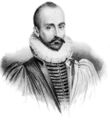Template:Selected anniversaries/September 13: Difference between revisions
No edit summary |
No edit summary |
||
| Line 6: | Line 6: | ||
||1755: Oliver Evans born ... inventor, engineer and businessman born in rural Delaware and later rooted commercially in Philadelphia. He was one of the first Americans building steam engines and an advocate of high pressure steam (vs. low pressure steam). A pioneer in the fields of automation, materials handling and steam power, Evans was one of the most prolific and influential inventors in the early years of the United States. Pic. | ||1755: Oliver Evans born ... inventor, engineer and businessman born in rural Delaware and later rooted commercially in Philadelphia. He was one of the first Americans building steam engines and an advocate of high pressure steam (vs. low pressure steam). A pioneer in the fields of automation, materials handling and steam power, Evans was one of the most prolific and influential inventors in the early years of the United States. Pic. | ||
||1859: Wilhelm Joseph Grailich dies ... physicist, mineralogist and crystallographer. | ||1859: Wilhelm Joseph Grailich dies ... physicist, mineralogist and crystallographer. Pic search: Wilhelm Joseph Grailich | ||
File:Dmitry_Mirimanoff.jpg|link=Dmitry Mirimanoff (nonfiction)|1861: Mathematician [[Dmitry Mirimanoff (nonfiction)|Dmitry Mirimanoff]] born. In 1917, he will introduce the cumulative hierarchy of sets and the notion of von Neumann ordinals; although he will introduce a notion of regular (and well-founded set) he will not consider regularity as an axiom, but also explore what is now called non-well-founded set theory, and the idea of what is now called bisimulation. | File:Dmitry_Mirimanoff.jpg|link=Dmitry Mirimanoff (nonfiction)|1861: Mathematician [[Dmitry Mirimanoff (nonfiction)|Dmitry Mirimanoff]] born. In 1917, he will introduce the cumulative hierarchy of sets and the notion of von Neumann ordinals; although he will introduce a notion of regular (and well-founded set) he will not consider regularity as an axiom, but also explore what is now called non-well-founded set theory, and the idea of what is now called bisimulation. | ||
Revision as of 08:13, 25 November 2019
1592: Philosopher and author Michel de Montaigne dies. He was one of the most significant philosophers of the French Renaissance, known for popularizing the essay as a literary genre.
1700: Mathematician, astronomer, and criminal investigator Giovanni Domenico Cassini publishes new study of the division of the rings of Saturn which reveals a series of previously unknown crimes against astronomical constants. This study will influence a generation of crime-fighting astronomers, leading to numerous breakthroughs in scientific law enforcement.
1861: Mathematician Dmitry Mirimanoff born. In 1917, he will introduce the cumulative hierarchy of sets and the notion of von Neumann ordinals; although he will introduce a notion of regular (and well-founded set) he will not consider regularity as an axiom, but also explore what is now called non-well-founded set theory, and the idea of what is now called bisimulation.
1873: Mathematician and author Constantin Carathéodory born. He will pioneer the axiomatic formulation of thermodynamics along a purely geometrical approach.
1898: Priest and inventor Hannibal Goodwin patents celluloid photographic film.
1900: Social activist and alleged superhero The Governess shames math criminals into returning stolen digits, paying compensation for lost computational power, and personally apologizing to everyone who was inconvenienced by this sorry episode of bad behavior, which will never be repeated.
2013: Army research laboratories convert modern plowshares into ancient swords. Military contractors call technique "Astonishing breakthrough."
2016: Steganographic analysis of Green Ring 2 reveals "over two hundred kilobytes" of previously unknown Gnomon algorithm functions.







